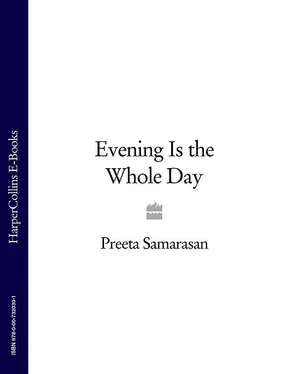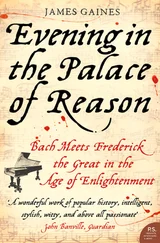“You remember how I knew I was dead, don’t you?” She doesn’t look at Aasha as she asks the question, but off into the distance, so as to hide her great yearning for the correct answer.
“Yes,” says Aasha, “of course I do. But tell me again anyway.”
“When I couldn’t see the sunlight and the birds. Before that I was alive, the whole time my Ma and I were sinking down through the pond—there were no fish in it at all, it was silent and dark like a big empty church—but I could see the light far away at the top, above the water. When I couldn’t see it anymore, that’s when I was dead.”
Aasha lays her head on Uma’s pillow, curls up, and closes her eyes to meditate once more upon this familiar confidence.
The following afternoon Amma finds Aasha’s abandoned drawing of Chellam under the dining table. She squints briefly at the drawing, and then, deciding it must be a character from one of Aasha’s storybooks, makes her list for Mat Din on the back. Chocolate wafers, Nutella, star anise for mutton curry, tinned corn and peas to go with chicken chops.
2 CONTENTS 1. The Ignominious Departure of Chellamservant Daughter-of-Muniandy 2. Big House Beginnings 3. The Necessary Sacrifice of the Burdensome Relic 4. An Old-Fashioned Courtship 5. The Recondite Return of Paati the Dissatisfied 6. After Great Expectations 7. Power Struggles 8. What Aasha Saw 9. The Futile Incident of the Sapphire Pendant 10. The God of Gossip Conquers the Garden Temple 11. The Final Visit of the Fleet-footed Uncle 12. The Unlucky Revelation of Chellam Newservant 13. What Uncle Ballroom Saw 14. The Golden Descent of Chellam, the Bringer of Succor 15. The Glorious Ascent of Uma the Oldest-Eldest Acknowledgments Copyright EVENING IS THE WHOLE DAY Preeta Samarasan About the Publisher
BIG HOUSE BEGINNINGS CONTENTS 1. The Ignominious Departure of Chellamservant Daughter-of-Muniandy 2. Big House Beginnings 3. The Necessary Sacrifice of the Burdensome Relic 4. An Old-Fashioned Courtship 5. The Recondite Return of Paati the Dissatisfied 6. After Great Expectations 7. Power Struggles 8. What Aasha Saw 9. The Futile Incident of the Sapphire Pendant 10. The God of Gossip Conquers the Garden Temple 11. The Final Visit of the Fleet-footed Uncle 12. The Unlucky Revelation of Chellam Newservant 13. What Uncle Ballroom Saw 14. The Golden Descent of Chellam, the Bringer of Succor 15. The Glorious Ascent of Uma the Oldest-Eldest Acknowledgments Copyright EVENING IS THE WHOLE DAY Preeta Samarasan About the Publisher
IN 1899, Appa’s grandfather sailed across the Bay of Bengal to seek his fortune under familiar masters in a strange land, leaving behind an emerald of a village on the east coast of India. Barely had he shuffled off the boat with the rest of that vast herd in Penang when a fellow offered him a job on the docks, and there he toiled, sleeping four or five hours a night in a miserable dormitory, sending the bulk of his wages home, wanting nothing more for himself than to be able to pay his passage back home someday.
What changed his dreams in twenty years? All Appa’s father, Tata, knew of it was that by the time he was old enough to stand before his father in knee-length khakis for morning inspections before school, his father was saying: “Study hard. Study hard and you won’t have to be a coolie like me.” Every single goddamn morning he said it, the milky coffee frothing in his mustache. Study hard and the world will be yours. You could be a rich man. With a bungalow and servants.
And so Tata studied hard enough to get himself a clerk’s position with the Cowan & Maugham Steamship Company when he left school at sixteen, and somewhere in all that hoping and studying and preparing, something else changed: India ceased to be home. Sometimes it glimmered green and gold in Tata’s father’s tales of riverbank games and ten-day weddings and unbreakable blood bonds. At other times it was a threat, a nightmare, a morass in which those who hadn’t been lucky enough to escape still flailed. But Tata had no pictures of his own to attach to his father’s word for India: Ur , the country. This, this flourishing, mixed-up, polyglot place to which they had found their way almost by accident, this was his country now. Malays Chinese Indians, motley countrymen they might be, but countrymen they were, for better or for worse. What was coming was coming to them all. It would be theirs to share.
This was what Tata, eyes shining in the dark, told his pretty wife. It’s our country, not the white man’s . And when she said, But they’ve only been good to us , he insisted: You don’t know. You don’t know their dirty hearts. But you’ll see what this country can become without them. You’ll see .
To his five children—Raju the good-for-everything, Balu the good-for-nothing, and their three inconsequential sisters—Tata regularly said: We’re lucky to live here. It’s the best place on earth, none of India’s problems. Peace and quiet and perfect weather. Just work hard and the world could belong to you here . Then he’d ruffle the hair on Raju’s attentive head and box distracted Balu’s ear.
By the time Tata retired, in 1956, he owned a shipping company that rivaled his old employer’s. A wry sun was setting with a vengeance on the British Empire. Tata decided to buy himself a house that would declare his family’s stake in the new country. A great house, a grand house, a dynastic seat. He would leave Penang and look for such a house in Ipoh, far away from the dockyards, hilly, verdant, the perfect place to retire.
The house of Tata’s dreams belonged to one Mr. McDougall, a dyspeptic Scotsman who had owned two of the scores of mines that had sprouted up in and around Ipoh in the 1850s to tap the Kinta Valley’s rich veins of tin. He had already sold the mines to a Chinese towkay; now he had only to get rid of his house.
Mr. McDougall had three teenage children who’d been born and bred among the Chinese miners’ offspring in Ipoh, running around in Japanese slippers and eating char siu pau for breakfast. He also had a mistress and a bastard child, whom he kept in relative luxury in a bungalow in Tambun. Mr. McDougall’s life had meandered pleasantly along its course for years—mornings visiting the mines, afternoons with the mistress, evenings at the club—when he decided to leave the country, for two reasons. The first was that Her Majesty’s government was preparing to withdraw. The second was that his mistress, sniffing Mr. McDougall’s own flight in the air, had begun to demand a bigger house, a chauffeured car, and a wedding ring. If you don’t leave your family , she told him, I’ll come and pull you away myself. I’ll drag you off with my hands and my teeth, and your wife can watch .
In response, Mr. McDougall had whisked his wife—Elizabeth Mc-Dougall, née Fitzwilliam, a colonel’s daughter and in her time a great beauty whose attentions all the British bachelors of Malaya had coveted—and their three children off to a home they’d never known in the Scottish Highlands. And the mistress? For attention, for revenge, or out of simple, untainted despair, she had drowned herself and her six-year-old daughter in a mining pond. If Mr. McDougall had learned of her demise, he had never given any sign of it.
“I’m not sure his legitimate children fared any better,” Appa would say whenever he told the story of the house. “Wonder what happened to them. The father simply uprooted them just like that and packed them all off lock stock and barrel.”
Lock, Stock and Barrel, three men in a tub.
One said roll over and another said rub .
Читать дальше












